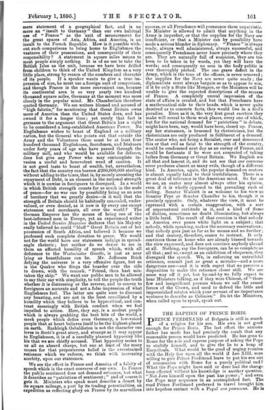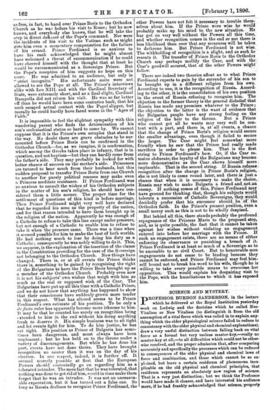THE BAPTISM OF PRINCE BORIS.
PRINCE FERDINAND of Bulgaria is still in search of a religion for his son. His own is not good enough for Prince Boris. The last effort the anxious father has made has had precisely the result that any reasonable person would have predicted. He has gone to Rome for the sole and express purpose of asking the Pope to stultify himself, and to give the lie to a heap of Encyclicals. What would be the good of urging reunion with the Holy See upon all the world if Leo %ILL were willing to give Prince Ferdinand leave to put his son out of communion with Rome for a purely political end? What the Pope might have said or done had the change been effected without his knowledge is another question. "Not Jove himself upon the past has power ; " and even the Pope may acquiesce in an accomplished fact. The road Prince Ferdinand preferred to travel brought him into hopeless contact with a Papal non pouumus. He Is as free, in fact, to hand over Prince Boris to the Orthodox Church as he wa3 before his visit to Rome; but he now knows, and, everybody else knows, that he will take the step in direct defi Luce of the Pope's command. Nor were the incidents of his visit to the Vatican such as might give him even a momentary compensation for the failure of his errand. Prince Ferdinand is so anxious to have his rank acknowledged that he might almost have welcomed a threat of excommunication if he could have cheered himself with the thought that at least he would be excommunicated as a Sovereign Prince. But the Pope's reception of him suggests no hope on this score. He was admitted to an audience, but only in "strict incognito." His unfortunate suite were not allowed to see the Pope at all. The Prince's interviews alike with Leo XIII. and with the Cardinal Secretary of State, were extremely short, and as a final slight, Cardinal Rampolla did not return his visit. He was so far better off than he would have been some centuries back, that his neck escaped actual contact with the Papal slipper, but morally he could hardly have fared worse in the " Ages of Faith."
It is impossible to feel the slightest sympathy with this wandering parent who finds the determination of his son's ecclesiastical status so hard to come by. We cannot suppose that it is the Prince's own scruples that stand in the way. No doubt there are grave obstacles to be sur- mounted before Prince Boris can be confirmed in the Orthodox Church—for, as we imagine, it is confirmation, which among the Greeks takes place in infancy, that is in question, and not baptism—but they can hardly come from the father's side. They may probably be looked for with better chance of success on the mother's side. Princesses are tutored to bear much from their husbands, but this sudden proposal to transfer Prince Boris from one Church to another for purely political reasons may make even a Princess meditate resistance. If Prince Ferdinand was so anxious to consult the wishes of his Orthodox subjects in the matter of his son's religion, he should have con- sidered them a. little sooner. The proper time for the settlement of questions of this kind is before marriage. Then Prince Ferdinand might very well have declared that he regarded his sons as the property of the nation, and for that reason intended to have them brought up in the religion of the nation. Apparently he was enough of a Catholic to refuse to take this line except under pressure, but not enough of a Catholic to enable him to refuse to take it when the pressure came. There was a time when it seemed possible for him to make the best of both worlds. He had nothing much to lose by doing his duty as a Catholic ; consequently he was nobly willing to do it. This, we suppose, is the explanation of the insertion of the clause in ihe Constitution providing for the case of the Sovereign not belonging to the Orthodox Church. Now things have changed. There is, or at all events the Prince thinks there is, something to be gained by recognising the right of the Bulgarians to have the Prince Boris brought up as a member of the Orthodox Church. Probably even now it is not his subjects' own wishes that weigh with him so much as the real or supposed wish of the Czar. The Bulgarians have put up all this time with a Catholic Prince, and we do not know that anything has happened to show that their consciences have suddenly grown more tender in this respect. What has altered seems to be Prince Ferdinand's own estimate of his position. To be only a de facto ruler has apparently become more irksome to him. It may be that he counted too surely on recognition being xtended to him in the end without his doing anything fresh to deserve it. His simple business was to sit tight and let events fight for him. To do him justice, he has sat tight. His position as Prince of Bulgaria has some- times been dangerous, and must always have been unpleasant ; but he has held on to the throne under a variety of discouragements. But while he has done his part, events have not done theirs. They have brought recognition no nearer than it was on the day of his election. In one respect, indeed, it is further off. It seemed scarcely possible at first that the European Powers should contentedly go on regarding him as a tolerated intruder. The mere fact that he was tolerated, that nothing was done to get rid of him, would in time make them forget that he was an intruder. It was not an unreason- able expectation, but it has turned out a false one. So long as Russia declines to recognise Prince Ferdinand, the other Powers have not felt it necessary to trouble them- selves about him. If the Prince were wise he would probably make up his mind to the new situation. He has got on very well without the Powers all this time, and whether recognition comes in the end or not there is less likelihood than ever that any measures will be taken to dethrone him. But Prince Ferdinand is not wise. The withholding of recognition is a slight, and as such he resents it. The transfer of Prince Boris to the Orthodox Church may perhaps mollify the Czar, and with the Czar's goodwill secured, that of the other Powers might follow.
There are indeed two theories afloat as to what Prince Ferdinand expects to gain by the surrender of his son to be brought up in a different religion from his own. According to one, it is the recognition of Russia. Accord- ing to the other, it is the consolidation of his own position in the event of Russia refusing to recognise him. The objection to the former theory is the general disbelief that Russia has made any promises whatever to the Prince ; the objection to the latter is the want of evidence that the Bulgarian people have any strong feeling on the religion of the heir to the throne. But a Prince who cannot get all he wants may very well be con- tent with a part, and there is, at all events, a chance that the change of Prince Boris's religion would secure the smaller advantage, even though it failed to secure the larger. The Czar might feel somewhat more friendly when he saw that the Prince had really made sacrifices in order to please him. That is the first string to Prince Ferdinand's bow. Or, if the Czar re- mains obdurate, the loyalty of the Bulgarians may become more demonstrative as the Czar shows himself, more , implacable. That is the second string. If Russia refusew. - recognition after the change in Prince Boris's religion,. she is not likely to come round later, and there is just chance that when it is necessary to make the choice, Russia may wish to make Bulgaria a friend and not an enemy. If nothing comes of this, Prince Ferdinand may have ground for thinking that, though his subjects would tolerate a succession of Catholic Sovereigns, ihey would decidedly prefer that his successor should. be of' the Orthodox faith. In the Prince's present position, even a small mercy such as this is not to be wholly despised.
But behind all this, there stands probably the profound repugnance of the Princess Marie to the proposed step, and, as is quite possible, the fact that it cannot be taken against her wishes without violating an engagement entered into before her marriage with the Prince. If such an engagement exists, there are no means of either enforcing its observance or punishing a breach of it. Prince Ferdinand is at least so much of a Sovereign as to be amenable to no civil Court. But to honourable men engagements do not cease to be binding because they cannot be enforced, and Prince Ferdinand may feel him- self bound not to break his word to his wife, though he is willing to take every possible means to overcome her opposition. This would explain his despairing visit to the Pope, with the humiliations to which it has exposed him.







































 Previous page
Previous page